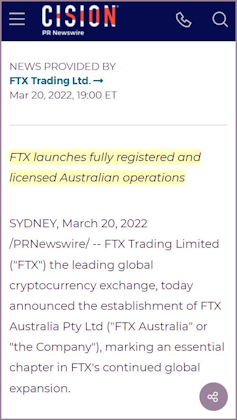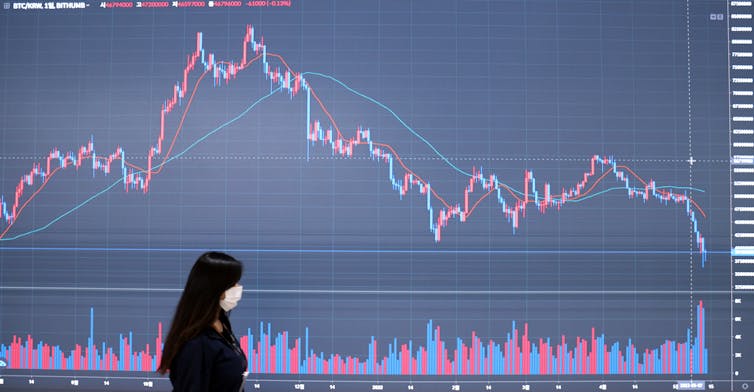When cryptocurrency replace FTX Crew collapsed within the Bahamas ultimate month, its native subsidiaries FTX Australia Pty Ltd and FTX Categorical Pty Ltd fell over too.
The Australian corporations had been positioned into management on November 11 and inside of days the Australian Securities and Investments Fee (ASIC) had suspended the Australian monetary provider licence FTX Australia had held since March 2022.
The truth that FTX Australia had an Australian monetary provider got here as a wonder to a few other people, who had wrongly assumed the entirety crypto-related changed into past the achieve of Australia’s regulators.
It additionally raised questions – together with for Assistant Treasurer Stephen Jones – about how FTX Australia controlled to procure its Australian monetary products and services licence, and the way ASIC perceived to have ignored the risk to interfere faster.
And it attracts wider consideration to the 20-year-old licensing machine and what an Australian monetary provider if truth be told manner for the corporations that experience them.
Authorized to do what, exactly?

FTX Buying and selling Restricted
When FTX commenced operations in Australia this yr, its media unlock changed into headed: “FTX launches absolutely registered and authorized Australian operations”.
However what precisely changed into it approved to do?
The Australian monetary provider (AFS) licensing regime in position for the reason that overdue Nineteen Nineties authorises each and every company to do specified issues, relating to specified monetary merchandise, for specified shoppers.
Every company’s licence is other, and what’s required by way of ASIC is other relying on what the company is approved to do.
FTX Australia’s licence approved it to deal in, make a marketplace for, and supply common recommendation in the case of derivatives and foreign currencies contracts to retail and wholesale shoppers. That’s it.
Observe that crypto-assets don’t seem to be specified, neither is working a crypto-asset replace.
The jury remains to be out globally on whether or not crypto-assets (as distinct from investments derived from crypto-assets) are monetary merchandise in any respect.
It’s conceivable to think about them as like gold bullion or wonderful artwork – or puppy rocks – the place the asset itself isn’t a monetary product, however a monetary product could be constituted of it.
If a cryptocurrency isn’t a monetary product, then licensing regulations can’t practice, which would possibly provide an explanation for why probably the most two companies arrange in Australia – FTX Categorical, which operated the crypto-exchange – changed into no longer AFS approved.
Learn extra:
‘I believed crypto exchanges had been protected’: the lesson in FTX’s cave in
The lesson is that understanding a company has an AFS licence most effective takes you up to now, and ceaselessly no longer very a ways in any respect.
Except you test the explicit authorisations, there’s no means of understanding how little the company you might be coping with is approved to do.
And ASIC-regulation doesn’t contain prudential legislation, which is directed on the balance of the corporate itself, making sure amongst different issues that it will have to be ready to satisfy its monetary commitments underneath cheap instances.
Prudential legislation is the process of the Australian Prudential Legislation Authority, which regulated neither FTX Australia nor FTX Categorical.
Licences on the market
FTX Australia’s ASIC licence changed into at the start granted to any person else totally again in 2008. A chain of takeovers supposed it handed thru plenty of fingers till it ended up with FTX in March this yr.
Whilst an authentic applicant has to meet rigorous assessments, this hasn’t at all times been the case for next clients.
ASIC has identified for years that its ASF licences had been finishing up in new fingers when corporations had been purchased and offered. In 2017, it requested the federal government’s ASIC Enforcement Evaluate Taskforce to counsel adjustments to the legislation that will permit it to revisit an AFS licence when its house owners modified.
The exchange that changed into ultimately legislated in 2020 most effective required licensees to notify ASIC when a licence modified fingers, inside of 30 days.
It didn’t require ASIC to approve the exchange in management.
Restricted ASIC powers
ASIC is in a position to inquire additional to resolve whether or not there may be reason why to imagine a brand new licensee changed into prone to contravene its statutory duties or is “have compatibility and right kind” – however it’s not required to take action.
If it unearths both that the licensee is prone to contravene its duties or that it’s not have compatibility and right kind, it is in a position to droop or cancel the licence after giving the brand new house owners a good listening to.
Learn extra:
How ‘weak credit’ lender Cigno has dodged ASIC’s take hold of
However such inquiries have no longer turn out to be regimen. Lots of the (masses of) licensee purchases notified each and every yr appear to move thru to the keeper, as did FTX’s.
Even supposing ASIC had reviewed FTX’s acquire of the licence in March 2022, it will smartly have discovered no grounds to revoke it, given the very restricted vary of actions it approved.
The FTX cave in might lead to ASIC converting its angle to change-of-control transactions involving AFS licensees, for which it will want extra sources.
However despite the fact that that occurs, shoppers would nonetheless be smartly urged to take care to know precisely what “AFS approved” actually manner.
Supply By way of https://theconversation.com/how-ftx-australia-was-able-to-claim-it-was-asic-licenced-196361


